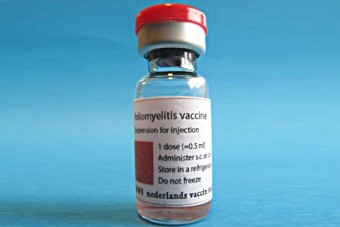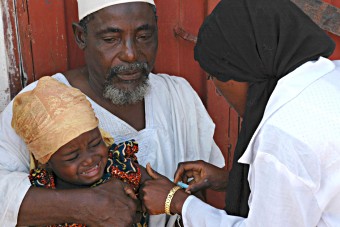
Inactivated polio virus vaccine
Phnom Penh, 22 November 2013 – The GAVI Alliance is to begin providing support for the introduction of inactivated poliovirus vaccine (IPV) as part of routine immunisation programmes in the world’s 73 poorest countries, GAVI’s Board decided today.
This decision will enable the Alliance to help countries reach more children with important vaccines, and play a complementary role supporting the efforts of the World Health Organization (WHO) and the Global Polio Eradication Initiative (GPEI) in eradicating polio as part of implementing the polio endgame strategy.
In May 2013, the World Health Assembly endorsed the new Polio Eradication & Endgame Strategic Plan 2013-2018, calling on countries to introduce at least one dose of IPV and begin the phased removal of oral polio vaccines. Removing oral polio vaccines will eliminate the risk of vaccine-associated polio outbreaks. Introducing IPV is a critical step to manage any risks associated with this phased removal.
Adding IPV to routine immunisation programmes will improve immunity and help prevent new vaccine-associated outbreaks from emerging. At the same time, it will hasten eradication of wild polio serotypes in the remaining endemic countries of Afghanistan, Nigeria and Pakistan.
Historic decision

Nigerian child receives IPV. Photo: WHO/F. Caillette/2006
“Supporting IPV introduction is an historic decision that supports the polio endgame strategy and benefits the world’s poorest and most marginalised children,” said GAVI Alliance Board Chair Dagfinn Høybråten. “In some parts of India, which have struggled with the life-long disabilities and deaths caused by polio for generations, we have already seen how polio and routine immunisation programmes can be linked to help boost coverage. It is a classic example of the importance of combining resources to extend reach and ensure that more children receive the protection they need and deserve, wherever they live.”
The GAVI Board endorsed opening a window of support for IPV for all GAVI-eligible countries and those graduating from GAVI support. Given the global health priority of polio eradication, the Board agreed to a number of policy exceptions for IPV, such as encouraging but not requiring countries to co-finance IPV introduction.
Donors have been actively engaged in discussions around GAVI’s role in supporting IPV introductions and have committed additional resources to GAVI from the pledges they made to the Polio Eradication and Endgame Strategic Plan. Providing the funds through GAVI will build upon the Alliance’s proven track record of supporting countries to strengthen immunisation services and introduce new vaccines.
Vaccine investment strategy
The GAVI Alliance Board also took decisions on additional vaccines for the Alliance’s future portfolio, having received detailed analysis on five disease areas as part of the Vaccine Investment Strategy. The Board:
- Decided new support would be made available for additional yellow fever campaigns in light of a resurgence of the disease in some parts of Africa.
- Approved a contribution towards a global cholera vaccine stockpile for the period 2014-2018 to increase access to oral cholera vaccine in outbreak situations and endemic settings.
- Agreed to continue to consider support for a malaria vaccine if and when one is licensed, prequalified by the WHO and recommended for use by the joint meeting of the WHO Strategic Advisory Group of Experts (SAGE) and the Malaria Programme Advisory Committee (expected in 2015), taking into account updated projections of impact, cost and country demand.
- Concluded that further evidence is necessary on the impact and operational feasibility of supporting the important rabies vaccine as well as influenza vaccines for pregnant women. The Board agreed that GAVI will fund an observational study to address critical knowledge gaps around access to rabies vaccine and will monitor the evolving evidence base for maternal influenza vaccination in coming years.
“New vaccines offer new hope to families and communities blighted by disease,” said Dagfinn Høybråten. “Our decisions are rightly based on a wide range of detailed analysis and evidence about how we can best use donor funding to have an impact of the lives of people living in some of the toughest conditions.”
Japanese encephalitis
At the meeting, the GAVI Board also took the decision to begin providing country support for a vaccine against Japanese encephalitis (JE).
The decision to offer JE vaccine support was taken as part of the previous Vaccine Investment Strategy, but a funding window could not be opened until an appropriate WHO prequalified product was available. In October the Chinese manufacturer Chengdu Institute of Biological Products Co. Ltd received WHO prequalification on its JE vaccine.
With more than 66,000 clinically confirmed cases each year JE is highly fatal, killing 30% of patients. With no treatment or cure, 20-40% of cases patients are left with long-term disabilities and neurological impairment, often severe enough to leave them requiring lifelong assistance.
GAVI-eligible countries whose children are at risk from JE will be able to apply for support to introduce JE vaccine in 2014, with Cambodia and Lao PDR expected to be among the first to submit applications.
The GAVI Board meeting was held in Phnom Penh, in Cambodia, and opened by Cambodian Prime Minister Hun Sen. It was the first major GAVI Alliance event to be held in South East Asia since its 2009 Partners’ Forum in Vietnam.
GAVI is funded by governments [Australia, Canada, Denmark, France, Germany, Ireland, Italy, Japan, Luxembourg, Netherlands, Norway, Republic of Korea, Russia, South Africa, Spain, Sweden, United Kingdom, United States], the European Commission, the Bill & Melinda Gates Foundation, as well as private and corporate partners [Absolute Return for Kids, Anglo American plc., The Children’s Investment Fund Foundation, Comic Relief, Dutch Postcode Lottery, His Highness Sheikh Bin Zayed Al Nahyan, JP Morgan, “la Caixa” Foundation, LDS Charities, Lions Clubs, OPEC and Vodafone].
Click to view the full donor list.

Inactivated polio virus vaccine
Phnom Penh, 22 November 2013 – The GAVI Alliance is to begin providing support for the introduction of inactivated poliovirus vaccine (IPV) as part of routine immunisation programmes in the world’s 73 poorest countries, GAVI’s Board decided today.
This decision will enable the Alliance to help countries reach more children with important vaccines, and play a complementary role supporting the efforts of the World Health Organization (WHO) and the Global Polio Eradication Initiative (GPEI) in eradicating polio as part of implementing the polio endgame strategy.
In May 2013, the World Health Assembly endorsed the new Polio Eradication & Endgame Strategic Plan 2013-2018, calling on countries to introduce at least one dose of IPV and begin the phased removal of oral polio vaccines. Removing oral polio vaccines will eliminate the risk of vaccine-associated polio outbreaks. Introducing IPV is a critical step to manage any risks associated with this phased removal.
Adding IPV to routine immunisation programmes will improve immunity and help prevent new vaccine-associated outbreaks from emerging. At the same time, it will hasten eradication of wild polio serotypes in the remaining endemic countries of Afghanistan, Nigeria and Pakistan.
Historic decision

Nigerian child receives IPV. Photo: WHO/F. Caillette/2006
“Supporting IPV introduction is an historic decision that supports the polio endgame strategy and benefits the world’s poorest and most marginalised children,” said GAVI Alliance Board Chair Dagfinn Høybråten. “In some parts of India, which have struggled with the life-long disabilities and deaths caused by polio for generations, we have already seen how polio and routine immunisation programmes can be linked to help boost coverage. It is a classic example of the importance of combining resources to extend reach and ensure that more children receive the protection they need and deserve, wherever they live.”
The GAVI Board endorsed opening a window of support for IPV for all GAVI-eligible countries and those graduating from GAVI support. Given the global health priority of polio eradication, the Board agreed to a number of policy exceptions for IPV, such as encouraging but not requiring countries to co-finance IPV introduction.
Donors have been actively engaged in discussions around GAVI’s role in supporting IPV introductions and have committed additional resources to GAVI from the pledges they made to the Polio Eradication and Endgame Strategic Plan. Providing the funds through GAVI will build upon the Alliance’s proven track record of supporting countries to strengthen immunisation services and introduce new vaccines.
Vaccine investment strategy
The GAVI Alliance Board also took decisions on additional vaccines for the Alliance’s future portfolio, having received detailed analysis on five disease areas as part of the Vaccine Investment Strategy. The Board:
- Decided new support would be made available for additional yellow fever campaigns in light of a resurgence of the disease in some parts of Africa.
- Approved a contribution towards a global cholera vaccine stockpile for the period 2014-2018 to increase access to oral cholera vaccine in outbreak situations and endemic settings.
- Agreed to continue to consider support for a malaria vaccine if and when one is licensed, prequalified by the WHO and recommended for use by the joint meeting of the WHO Strategic Advisory Group of Experts (SAGE) and the Malaria Programme Advisory Committee (expected in 2015), taking into account updated projections of impact, cost and country demand.
- Concluded that further evidence is necessary on the impact and operational feasibility of supporting the important rabies vaccine as well as influenza vaccines for pregnant women. The Board agreed that GAVI will fund an observational study to address critical knowledge gaps around access to rabies vaccine and will monitor the evolving evidence base for maternal influenza vaccination in coming years.
“New vaccines offer new hope to families and communities blighted by disease,” said Dagfinn Høybråten. “Our decisions are rightly based on a wide range of detailed analysis and evidence about how we can best use donor funding to have an impact of the lives of people living in some of the toughest conditions.”
Japanese encephalitis
At the meeting, the GAVI Board also took the decision to begin providing country support for a vaccine against Japanese encephalitis (JE).
The decision to offer JE vaccine support was taken as part of the previous Vaccine Investment Strategy, but a funding window could not be opened until an appropriate WHO prequalified product was available. In October the Chinese manufacturer Chengdu Institute of Biological Products Co. Ltd received WHO prequalification on its JE vaccine.
With more than 66,000 clinically confirmed cases each year JE is highly fatal, killing 30% of patients. With no treatment or cure, 20-40% of cases patients are left with long-term disabilities and neurological impairment, often severe enough to leave them requiring lifelong assistance.
GAVI-eligible countries whose children are at risk from JE will be able to apply for support to introduce JE vaccine in 2014, with Cambodia and Lao PDR expected to be among the first to submit applications.
The GAVI Board meeting was held in Phnom Penh, in Cambodia, and opened by Cambodian Prime Minister Hun Sen. It was the first major GAVI Alliance event to be held in South East Asia since its 2009 Partners’ Forum in Vietnam.
GAVI is funded by governments [Australia, Canada, Denmark, France, Germany, Ireland, Italy, Japan, Luxembourg, Netherlands, Norway, Republic of Korea, Russia, South Africa, Spain, Sweden, United Kingdom, United States], the European Commission, the Bill & Melinda Gates Foundation, as well as private and corporate partners [Absolute Return for Kids, Anglo American plc., The Children’s Investment Fund Foundation, Comic Relief, Dutch Postcode Lottery, His Highness Sheikh Bin Zayed Al Nahyan, JP Morgan, “la Caixa” Foundation, LDS Charities, Lions Clubs, OPEC and Vodafone].
Click to view the full donor list.
